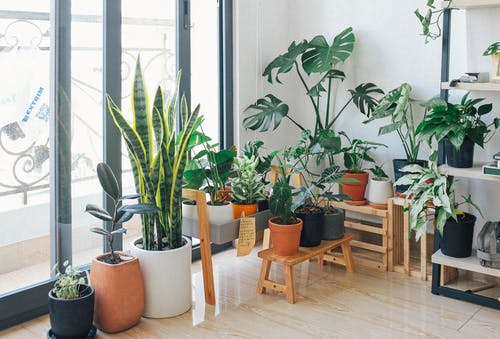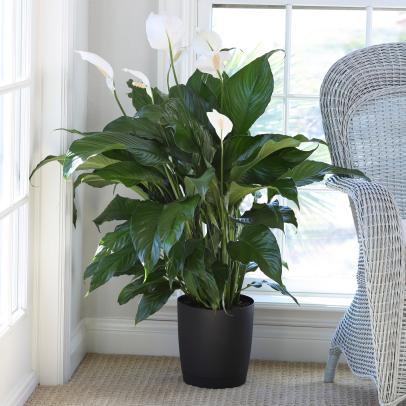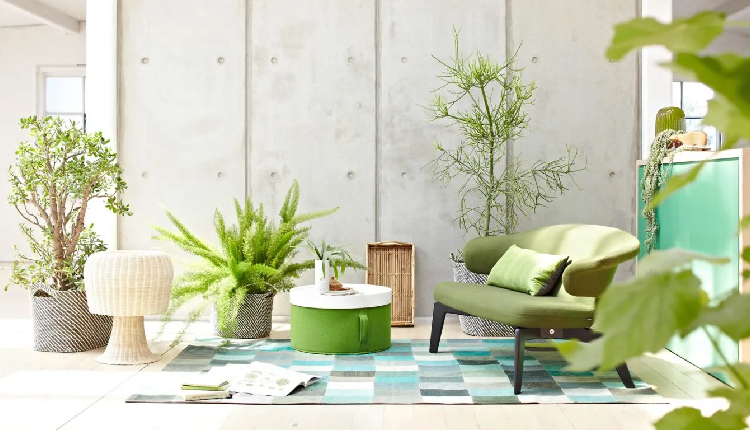It is scientifically proven that exposure to nature, plants, or any green spaces can help reduce stress, anxiety, and depression and thereby improve the mental health and overall well-being of a person. We need to give equal importance to strengthening our mental health as we would do to our physical health. With the pandemic and increasing stress and hustle culture, we tend to focus less on ourselves. It is highly important for us to care about ourselves first so we can contribute more to ourselves and to the world, after all, you can never pour from an empty cup. In this article, we discuss 7 ways plants can help improve your mental health and we have also listed a few of the plants that we think might be helpful to you.

Plants can add to the aesthetic appeal of the space you are living in or you are working in. Plants engage your smell and touch sense and calm your nerves providing you with a relaxing environment. Interacting with plants provides both psychological and physiological benefits, it also helps in improving your cognitive skills.
1. Plants can reduce stress and depression
There is something calming about gardening or even just watering your plants. They can bring about stillness and mindfulness when engaging with them and caring for them. Plants can trigger the release of serotonin which lifts mood and can reduce stress and depression. Being around plants or gardening soothes the nervous system, and slows down the heart rate and blood pressure. A walk through a park or in any natural set-up with plants and trees is reported to reduce anxiety and elevate the mood. Plants can help us recognise how our lives and our state of being mimic nature in its flowing state.
You may also like: Best Balcony Plants to add for A Beautiful Home
2. Plants can help in recovery and faster healing
A study has proven that patients in hospital rooms with plants or with access to a garden view recover faster than in a room with just concrete walls. Another study proved that gardening or tending to plants helped in reducing the symptoms of Post-Traumatic Stress Disorder (PTSD) in individuals.
3. Plants help in improved concentration and productivity
Studies reveal that students and employees in a space combined with greenery have higher concentration levels and are more attentive, and alert and showcase better creativity. They are also more relaxed, in better moods, and think clearly.
Studies reveal that walking in nature, or walking in parks has proven to improve the concentration of children with Attention-Deficit/Hyperactivity Disorder (ADHD). Short breaks in nature can help restore more information and improve attention span, improve creativity and cognitive functioning of both children and adults alike.
4. Plants provide a “low expectation companionship”
We sometimes feel that the environment we live in is a dog-eat-dog world. We may not always want to open up to a stranger or a new colleague as sometimes new people might have an underlying expectation from us. It is extremely important for every one of us to open up to a safe person may it be a friend or a family member or a therapist. When people are busy or you just want a hearing companion, plants can be of excellent help. Plants can be great listeners and they do not judge you no matter what, they can feel you and you would feel the companionship too.
5. House Plants can be a social ice breaker
When you have a get-together or a party in your house, plants provide a great conversation starter and get the conversation going. People who love plants, love finding their tribe. Plants can also be a great ‘thank you’ gift or a return gift for any party. You can customise the plants according to your guests and put a smile on their faces.
6. Plants can teach us life lessons
In the fast-growing urban cities, we often forget our role in the cycle of nature. Plants remind us about our link to nature and provide us perspective on our place and role.
When planting seeds or maintaining a garden not everything goes according to our plans. Some plants don’t thrive well no matter how we try to tend to them. It could be because of the weather, soil conditions in the area, pests or simply a human error. Plants teach us to let go and appreciate the time they brought happiness in our lives. Because sometimes not everything goes according to our plan and that’s okay and we have to move on.
We sometimes feel put down, broken or simply drained. Plants teach us that with the right care and enough sunshine they can bounce back from wilting to a healthy plants. The same applies to us, we need to take actions that can bring about a change in our life. We can at least start by hydrating ourselves and going for a short walk outside. We can slowly nourish ourselves back to health and get blooming.
7. House plants provide better air quality
Plants can increase the humidity in dry weather. Apart from helping us in our mental health, they can also improve the air quality of our homes. They can help reduce toxins and pollutants in the air and provide better air quality around us.
Now that we have discussed 7 ways plants can help improve your mental health, let’s check out a few of the house plants which might help you in starting your own garden.
1. Aloe Vera
Aloe vera is easy to care for and it multiplies on its own. It has anti-inflammatory and healing properties. It helps to heal surface-level wounds quicker. They can also be used to treat cuts, burns, and inflammation. It also has air purifying properties which help in reducing anxiety and stress.
2. Snake Plant
Snake plant helps improve indoor air conditions. It absorbs toxic pollutants and helps improve your sleep, mood and energy levels. Snake plant loves dry soil so you need not worry about watering the plant often. They are highly resilient plants and are a perfect choice for beginners.
3. Peace Lily

NASA studies reveal that peace lily is one of the most powerful plants in filtering toxins from the air. It also counteracts harmful pollutants and chemicals in an indoor setting. The peace lily is excellent in removing mould spores which are related to causing skin irritation, eyes and throat irritation. Many people have also claimed that peace lily has helped them to flourish physically, emotionally, mentally and spiritually.
4. English Ivy
English Ivy is one of the best plants to reduce Volatile Organic Compounds (VOC) like benzene, toluene, octane, and trichloroethylene from the air. They are great air purifying plants for your home. They also help in reducing allergy-causing irritants from the air and help people with asthma and allergies. English Ivy plants can help maintain the humidity in the house during hot and dry months.
5. Jade Plant

The Jade plant is also one of the powerful air-purifying plants. It is best at filtering toluene and acetone and other harmful chemicals from paints and cleaning products. All air-purifying plants help in providing a fresh and better environment for us which in turn helps us in reducing our stress and anxiety and calms us down. Apart from these amazing properties, the Jade plant is also believed to be a symbol of luck. And we all can use some luck in our life. They are also low-maintenance plants and are very pretty to look at.
6. Pothos
Pothos are one of the easiest plants to grow. You can grow them both in water as well as in soil. They thrive well even in low-light conditions. Even if you plant a few nodes of this plant, it will turn into a thick climbing plant within a few weeks of time. So there is no reason for you to not start gardening right away. Pothos are scientifically proven to help people with their mental health by calming them and relaxing them. Pothos come in many colours and varieties. Choose one to your heart’s liking.
7. Lavender
Who doesn’t love the whiff of beautiful lavender on their balcony? Lavender is claimed to be one of the most calming scents. Lavender has antiseptic and anti-inflammatory properties and they also reduce stress and anxiety. You can use lavender in your bath salts, soaks, or in a diffuser. Apart from their warm and calming scent, they are also very pretty to look at.
8. Jasmine

Speaking of scented plants, jasmine has one of the most calming floral scents. It soothes your mind on a busy day and makes you take a step back and gain some perspective on what’s going on. It reduces anxiety and stress. The scent of the jasmine plant or jasmine oil is proven to promote a good night’s sleep.
9. Rosemary
Rosemary is another beautiful-smelling plant. It is proven to reduce stress and calm us down. Scientists have proven that rosemary increases alertness and cognitive abilities. Rosemary can also be used in cooking and serves as a multi-functional plant.
10. Eucalyptus
If you are not a fan of the floral notes and are into woody and musk smells, then you should opt for eucalyptus. Eucalyptus has a warm aroma that immediately calms us down. It also aids in relieving asthma, congestion and cold. Eucalyptus baths also help relieve pain and sore muscles.
Conclusion
As we tend to our plants, we remember that we need to tend to our emotional state and our mental well-being. They teach us that small things add up to big things in life. And a small act of service can bring about huge amounts of happiness. As we prune our plants, we must remind ourselves to cut off the dead weight that’s holding us behind in life. When we change the soil of our plants, we need to remind ourselves that we need to change our surroundings and people who are not serving us anymore. When we add fertilizer and water, we need to remember about nourishing ourselves with the right nutrition, sleep, and rest that our mind and body deserve. We must also remember to add healthy relationships and hobbies into life to add more colour and smiles to our life.
We hope that the above-discussed 7 ways plants can help improve your mental health and some of the plants mentioned have provided you with some valuable information and encouraged you in starting your plant journey. Do let us know how your plants help you in your life if you are a plant parent already or let us know about your new plant journey if you are a beginner.
We will be delighted to have your thoughts and feedback. Please write to us at [email protected]
Follow Life and Trendz on Instagram: https://www.instagram.com/lifeandtrendz/
Facebook: https://www.facebook.com/lifeandtrendz
Twitter: https://twitter.com/LifeandTrendz


Comments are closed.